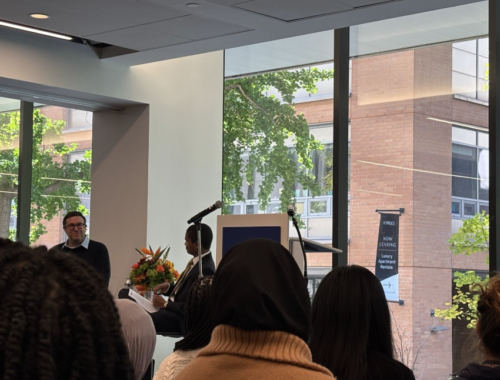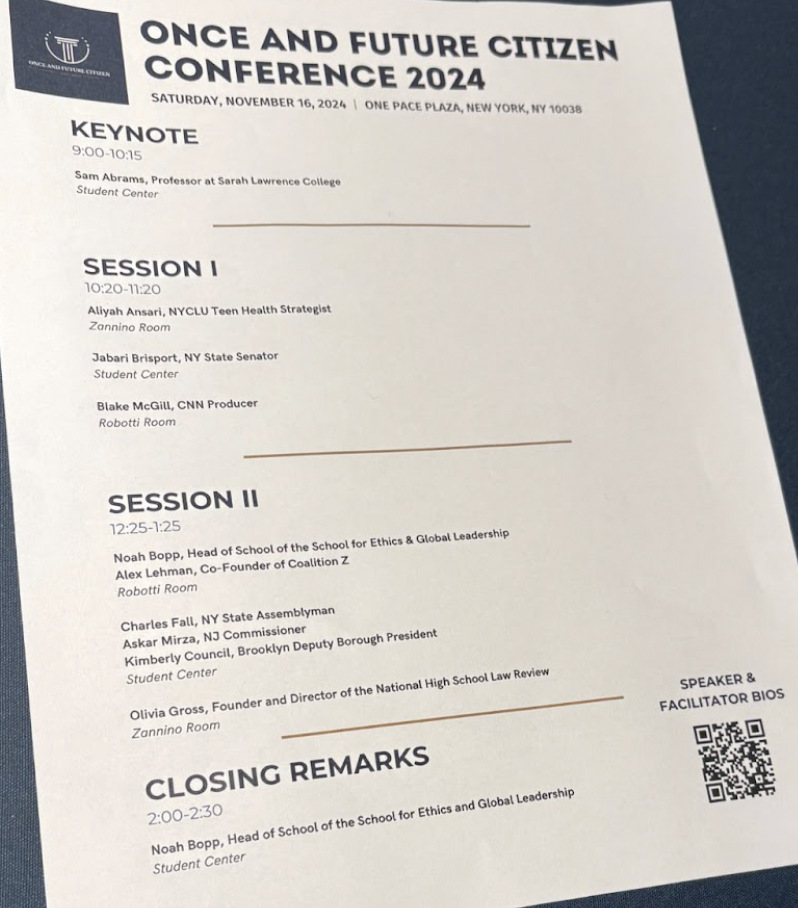A few days before the elections, I got a text from a friend inviting me to a student-led civic engagement conference. She is a graduate of the semester away program I will be doing in the spring of 2025: the School for Ethics and Global Leadership (SEGL) in Washington, D.C. This conference, Once and Future Citizen, was the culmination of an independent project at SEGL aimed to bring high school students together to discuss how to impact their communities effectively and ignite positive change.
My friend ended her invite to the November 18 conference, with, “Even if you’re not happy with the election results, this is a place for you to channel your feelings into action.” As I scanned the speaker list, I realized what she meant. Panelists included CNN correspondents, state senators, political scientists, professors and founders of organizations such as Coalition Z. Every speaker brought an immense amount of experience in their field to the table, reflected in their answers to questions attendees asked. On conference day, our discussions did not shy away from the recent elections. If anything, the results were analyzed in the context of the fluid social and political US landscape. Students from across the city and tunnel attended the conference and shared their experiences including volunteer work with the local government and contrasted their different experiences and lessons learned.
The opening speaker, political scientist and professor at Sarah Lawrence College Dr. Samuel Abrams, discussed how people voted “from their pockets” during the 2024 presidential election. He described this as economic retrospective voting, where the average American thinks about their food and family. Recently, this has caused polarization; voters are shifting away from Democrats and Republicans and toward independent categories. This is one of the many ways we are witnessing dynamic politics– parties are focusing on the votes of select demographics to win elections. Although this may seem catastrophic, it opens up paths for dialogue. Abrams argued that increased polarization means voters were able to find more of a voice. These conversations are fundamental in bridging differences and creating community. Our society is constantly changing, which is reflected in the curriculum of a course Abrams teaches (“The American Dream”) that changes every few years.
Not all change is negative, though. Jabari Brisport, the first openly gay person of color to be elected to the New York State Legislature, stressed how much his job required him to converse with his community members and that discussions with his constituents informed his political decisions. As a state senator, he aims to represent the people, and he hopes this is reflected in states around the nation. His actions represent his constituents, and he understands this is how he can make major changes. “You cannot stop the movement,” he said. “You can stop 30 senators, but can you stop 30,000 people? I don’t know.” Brisport ended with this message: even though we are youth, we hold power over our elected officials. If we see something we want to be changed, we have full authority to schedule a meeting with our state representative to discuss how these changes can be implemented. “You may not win the first time,” he rationalized, “but if you believe it is the right thing, you keep fighting until you succeed.” When legislators attempted to throw identity-based groups under the bus, Brisport protested against these actions. “It’s important we don’t leave anybody behind.”
The final discussion I attended was with panelists Noah Bopp (founder of SEGL) and Alex Lehman (SEGL graduate, Brown graduate). Lehman founded Coalition Z to connect nationwide officials with Gen Z students, describing her efforts as a way to ensure collaboration between these vastly different groups. “The only way change happens is when we work together,” she reasoned. Alex stressed the importance of being present, even when it’s difficult; she said it’s fundamental to “continu[e] to show up and realiz[e] impact looks very different” depending on the people involved. Everyone has something to bring to the table, and there is not just one conventional way to engage in discussion or change. Bopp brought a very similar message to the conversation. Through an Eleanor Roosevelt quote,“It is better to light one candle than to curse the darkness,” Bopp asked students to see moments of opportunities to make change a reality. One of his hopes for students leaving SEGL is they depart with more curiosity and humility than when they began the program.
In closing remarks, Bopp gave us each a Hershey’s Kiss wrapped in silver foil and led a discussion around the origins of the chocolate. His questions led to the fact that unpaid workers, mainly children and women, were the manufacturers of these chocolates. He then asked us what we were going to do about it; would we refuse to eat the chocolate, and would it make a difference? Or would we research ways to combat systemic human rights violations and hold our promises?
At Fieldston, I have had a similar discussion in Current Events at a Socratic Seminar about the mining conditions and human rights crisis in the Democratic Republic of Congo (DRC). Transnational corporations have major international influence by sourcing minerals from the DRC mines. One such company is Apple. We discussed whether it would be impactful to, as individuals, boycott Apple products. Or would broader systemic change be necessary? Classes like Current Events have helped sharpen my sense of civic engagement. The course’s teacher, Mx. Amore, aimed for students to become more curious about news and politics, both internationally and at home. They hoped students could “feel like they [could] see themselves and their place in the world and their role as global citizens.”
The Once and Future Citizens conference and my Current Events class have helped me think more critically about the world. By delving deeper into things I want to learn more about with a realistic lens, I have been able to question my and societal choices and determine how I can make the most impact. According to its mission statement, Once and Future Citizen aimed to “ignite a deep sense of civic responsibility in students and empower them to shape their communities with purpose and passion,” and it did just that.
Source: Malaika Singh







